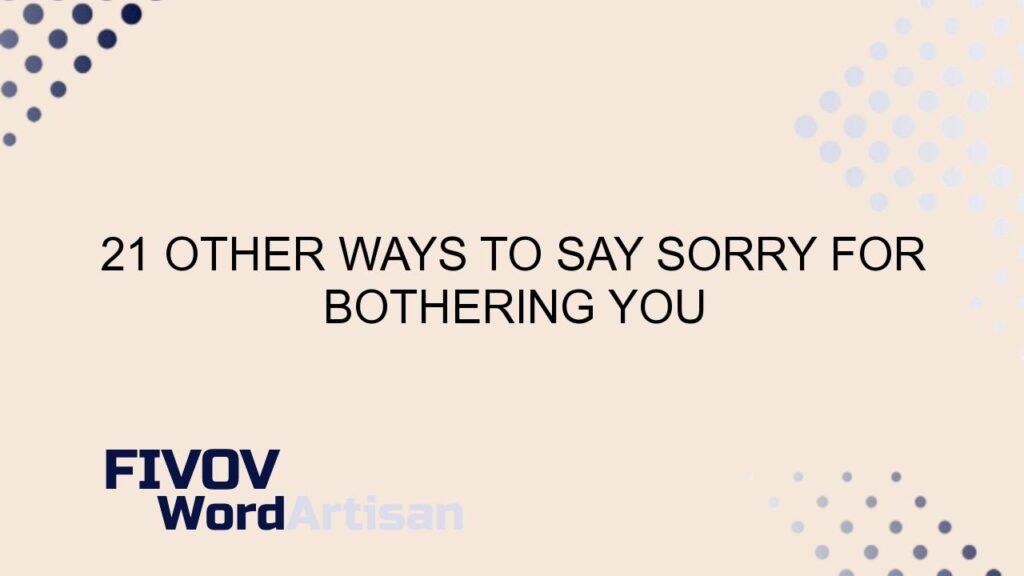Are you attempting to determine if something is feasible but find yourself needing to inquire first? Maybe you’re concerned that the phrase “Sorry for bothering you” might not be the most professional way to ascertain if an action can be undertaken.
MY LATEST VIDEOS
Well, you’ve come to the right place to find out more.
This article will show you how to professionally say “Sorry for bothering you” when you need it.
Other Ways to Say “Sorry for bothering you”
If you’re seeking alternative ways to convey the sentiment of “Sorry for bothering you,” here are 21 other expressions to consider using in various contexts.
1. Excuse me
When trying to get someone’s attention or seeking assistance, “Excuse me” is a polite way to initiate a conversation without feeling intrusive.
2. Pardon me
This phrase is suitable for situations where you accidentally interrupt someone or need to apologize for a minor disruption.
3. Apologies for the interruption
In a professional setting, this phrase conveys respect and acknowledges the potential inconvenience caused by the interaction.
4. May I have a moment of your time?
When asking for someone’s attention, using this phrase demonstrates consideration for their schedule and availability.
5. I hope I’m not disturbing you
By expressing your concern for the other person’s ongoing activities, you show empathy while seeking their assistance.
6. Is now a good time to talk?
This question allows the other person to decide if they are available to engage in a conversation without feeling pressured.
7. I don’t mean to intrude
Use this phrase to convey your awareness of potential intrusion and to apologize preemptively.
8. Please forgive the interruption
This formal apology acknowledges the imposition and seeks understanding from the other person.
9. Mind if I ask a quick question?
When seeking information or assistance, this question seeks permission in a respectful manner.
10. I don’t want to disturb you
Expressing this sentiment conveys your consideration for the other person’s activities and time.
11. I hope I’m not imposing
By acknowledging the possibility of imposing on the other person, you show respect for their boundaries.
12. Do you have a moment to spare?
This question respects the other person’s time and allows them to decide if they can accommodate the interaction.
13. I’ll be brief
When seeking a moment of someone’s time, assuring them of the brevity of the interaction shows consideration for their schedule.
14. I’ll try not to take up too much of your time
By expressing your intention to be concise, you demonstrate respect for the other person’s time.
15. I don’t mean to be a bother
Apologizing in advance for potentially causing inconvenience shows thoughtfulness and consideration.
16. Could I have a moment to speak with you?
Seeking permission to converse demonstrates respect for the other person’s attention and time.
17. I’ll make this quick
By assuring the other person of the brevity of the interaction, you demonstrate consideration for their schedule.
18. I hope I’m not disrupting anything
Expressing this sentiment conveys your awareness of the other person’s ongoing activities.
19. I don’t mean to disturb you
Apologizing for the potential disturbance shows respect for the other person’s space and time.
20. Can I have a moment of your time?
Seeking permission and acknowledging the other person’s availability are important aspects of respectful communication.
21. I hope this isn’t inconvenient
Expressing concern for the other person’s potential inconvenience shows empathy and respect.
Now that you have a variety of alternatives to “Sorry for bothering you,” you can choose the most appropriate expression for your specific situation.
Remember, it’s essential to consider the context, the nature of the interaction, and the relationship with the person you are addressing. Using the right phrase can leave a positive impression and facilitate effective communication.
By using these alternative expressions, you can convey your message in a professional and considerate manner without feeling intrusive or apologetic.
In conclusion, these alternative ways to say “Sorry for bothering you” offer a range of polite and professional options for initiating conversations, seeking assistance, or acknowledging potential interruptions.
We hope you found this article helpful. If you did, please consider sharing it with others who may benefit from learning different ways to communicate politely and professionally in various situations. Thank you for reading!




